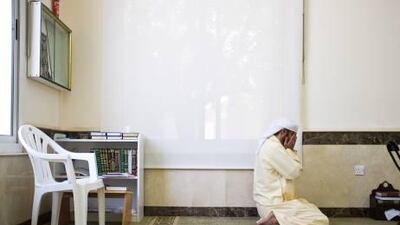DUBAI // Hidden from view by neem trees, the Shams Abdul Raheem Mosque in Jumeirah is a return to simpler times.
The building in the heart of a long-established Emirati community is barely visible from the road. It is on the corner of Al Bagara Street near Safa Park, and backs on to the Jumeirah Model School grounds.
The only clues to its presence are a small minaret peeking above the tree tops and the devoted worshippers who trickle in and out at prayer time.
It may appear modest but the mosque has helped to foster a strong sense of community spirit among the people who use it.
"This is such a wonderfully simple building that as soon as you come inside you feel a sense of calmness," says Taha Abdul Razzak, the imam of the mosque since it opened in March 1999.
"I always wanted to be an imam but I didn't choose this mosque, it chose me."
Mr Razzak, 42, a father of three who lives with his family in an adjoining building, describes the architecture as Arabic in its simplest form.
The outside is painted white with angular sides. It is surrounded by trees that seem to wrap their branches around the building.
There is a single ground-floor prayer room and large arched windows, allowing for plenty of natural light. Worshippers pray on an olive-green, Turkish carpet. There are dozens of Qurans and other Islamic books on shelves around the room.
Above, there are three chandeliers and a couple of fans helping to circulate the conditioned air.
"I would describe it as traditional Arabic and Emirati design, especially the arched doors," Mr Razzak says. "But for me, when you come inside a mosque your focus should be on your prayers and Allah. You don't want to be looking around and admiring the architecture."
Although there are many mosques in the area, Shams Abdul Raheem Mosque's intimate atmosphere has inspired a loyal congregation of up to 65 people, most of whom live within walking distance.
"I know most if not all of the people who attend prayers at the mosque," Mr Razzak says.
"This is the one place where everyone meets up together. We have a very happy and relaxed atmosphere, especially during Ramadan.
"Even after prayers have taken place, people stay afterwards to talk to one another. There is a really strong sense of community and we have generations of the same family worshipping here."
Worshippers are so happy with the mosque that they have no wish for it to be expanded.
"This is a very special mosque," says Saeed Hareb, 49, an Emirati who recently attended midday prayers there with his son Omar, 8. "There is something truly inspiring about the simplicity of this mosque."
Mr Hareb has been praying at the mosque for more than a decade, and says he feels the community bond it has helped to foster is very important.
"Inside the mosque everyone is equal, and it doesn't matter if you're rich or poor," he says.
Another Emirati, who works as a policeman but wishes not to be identified, agrees.
"I come here because it is close to my house and most of my friends and relatives attend services here as well," he says.
"It's always a happy atmosphere and, although most of the people are Emiratis, we also get many Indians and Pakistanis."
He says he tries to attend all of his daily prayers at the mosque but admits to visiting some of the other mosques in the neighbourhood on occasion.
"Over the years, it has become such a habit to meet your neighbours here that when you don't see someone at prayers, people ask what has happened," he says.
"People check on their friends and neighbours when they don't attend, and it's usually because they are in hospital or are out of the country. We go to see them to see if they are OK."

